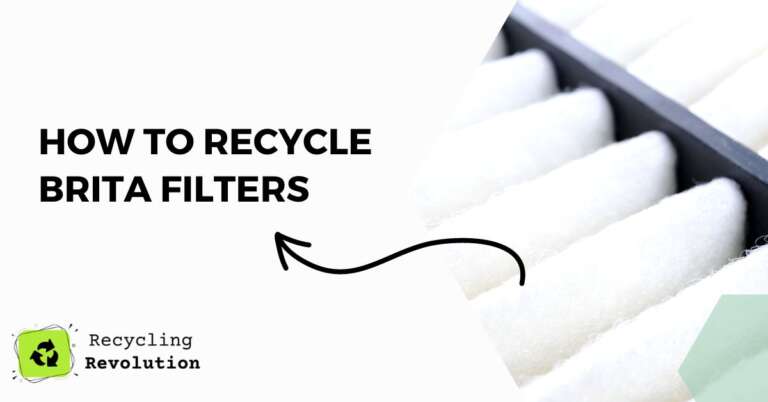Ah, the refreshing taste of clean water, thanks to our trusty Brita filters. But what happens once they’ve served their purpose?
If you’re like me, you’ve often wondered how to recycle Brita filters, both for the sake of the environment and your own peace of mind.
TL;DR: To recycle Brita filters, allow them to dry out for a few days, pack them into a Brita-branded envelope, and mail them back to Brita’s recycling partner. Not only does this process contribute to a more sustainable world, but it also repurposes the filter components into useful products. Now, let’s dive deeper into the nitty-gritty of Brita filter recycling!
Understanding the Need for Recycling
Every year, millions of water filters, including Brita, reach the end of their life cycle. While tossing them in the trash may seem like the easy way out, it’s neither eco-friendly nor sustainable.
In fact, filters in landfills contribute to environmental harm. A study by the Environmental Protection Agency found that water filters left in landfills can leak harmful chemicals into the environment. With that in mind, I recommend taking the extra step to recycle your used filters.
Prepping Your Brita Filter for Recycling
Before jumping into the recycling process, it’s vital to prep your filter.
- Drying Out the Filter: Start by removing the filter from your pitcher or dispenser and letting it dry out. This can take anywhere from three to seven days. Place it in a well-ventilated area, ensuring it’s completely dry before moving on. This step is essential to prevent mold growth during shipping.
- Packing the Filter: Brita provides special recycling envelopes, but if you don’t have one, you can still use any envelope or small box. Just make sure to label it clearly as “Brita Filter Recycling.”
The Recycling Process: What Actually Happens
I recommend getting a visual grasp of where your filters end up. Brita collaborates with a recycling partner called TerraCycle, which specializes in hard-to-recycle materials.
- Separation: Once TerraCycle receives the used filters, they separate the plastic casing from the inner filter media.
- Recycling and Repurposing: The plastic casings are then processed and converted into pellets, which are repurposed into items like outdoor benches and watering cans. Meanwhile, the filter media (which comprises activated carbon and ion-exchange resin beads) are transformed into energy.
By sending your Brita filters for recycling, you’re not only diverting waste from landfills but also contributing to the creation of useful products and energy.
Why Not Just Toss Them?
Beyond the apparent environmental damage, there are economic implications. Landfills are costly to maintain.
And, according to a study by the Council for Research on Water Resources, when items like Brita filters end up in landfills, they contribute to rising waste management costs, which can eventually be reflected in our tax bills.
Taking the Initiative: Spreading the Word
I recommend always being an advocate for the environment. Share with your friends, family, and coworkers about the importance of recycling Brita filters.
Perhaps you could even start a collection drive in your community or workplace. It’s these collective efforts that lead to meaningful change.
The Science Behind Brita Filters
Before delving deeper into the recycling process, let’s take a moment to understand what’s inside a Brita filter. The magic behind the clean water we enjoy is an intricate blend of activated carbon and ion-exchange resin beads.
- Activated Carbon: Derived from coconut shells, activated carbon is superb at adsorbing organic impurities. When water flows through the carbon, impurities like chlorine, which affects taste and odor, stick to the carbon particles.
- Ion-Exchange Resin Beads: These tiny, powerhouse beads are responsible for reducing metals like copper, mercury, and cadmium that can infiltrate our water systems through plumbing and other environmental means.
Knowing what’s inside our Brita filters not only emphasizes the importance of recycling but also gives us an appreciation of the science at play.
Economic Benefits of Recycling
Apart from environmental implications, recycling Brita filters has economic perks:
- Reduction in Manufacturing Costs: By reusing materials from recycled products, manufacturers can reduce the raw materials required, which can lead to cost savings in the long run.
- Job Creation: Recycling initiatives like TerraCycle’s program generate employment opportunities in the recycling and manufacturing sectors.
Best Practices for Bulk Recycling
For those avid recyclers among us who might accumulate a sizable collection of used filters over time (or for those managing the recycling efforts in larger households or offices), some best practices can make the process smoother:
- Store in a Cool, Dry Place: If you’re gathering multiple filters before sending them for recycling, ensure they are stored in a cool, dry place to prevent mold or bacterial growth.
- Bulk Shipments: I recommend waiting until you have at least five or more filters before shipping them off. This reduces the carbon footprint associated with multiple shipments.
- Engage Your Community: Consider starting a local collection initiative in your neighborhood or workplace. Collective efforts can reduce shipping costs and make a more significant environmental impact.
Environmental Stats & Facts
Water Conservation: Did you know that for every pound of new plastic produced, up to 24 gallons of water are used? By recycling the plastic components of Brita filters, we indirectly conserve water, as recycled plastic manufacturing uses significantly less water than producing new plastic.
Emission Reduction: According to a report by the Plastic Recycling Corporation, recycling plastic leads to a 70% reduction in greenhouse gas emissions compared to new plastic production. Hence, by recycling Brita filters, we’re playing a part in combating global warming.
The Wider Impact of Brita’s Sustainability Efforts
While our focus here is on recycling Brita filters, it’s worth noting that Brita’s commitment to sustainability goes beyond filter recycling:
- Reducing Plastic Bottle Waste: By using Brita filtered water, we reduce the need for single-use plastic bottles. Brita estimates that one filter can replace up to 300 standard 16.9-ounce bottles. That’s a significant reduction in potential plastic waste!
- Packaging Initiatives: Brita has been striving to make its packaging more sustainable by using recycled materials and ensuring that it’s 100% recyclable.
In essence, by choosing to recycle our Brita filters, we’re aligning ourselves with a brand that is proactive in its environmental commitments.
Recycling these filters is not just a singular act; it’s a step towards a broader goal of global sustainability. So the next time you sip that crystal clear water, remember that there’s more to your Brita filter than meets the eye. It’s a testament to science, innovation, and a greener future.
Conclusion
In the grand scheme of things, recycling Brita filters might seem like a small gesture. But imagine the collective impact if all Brita users took this initiative.
By understanding and following the steps detailed in this guide, you’re not only ensuring a cleaner planet but also fostering a sustainable mindset that can ripple through your community.
Remember, each Brita filter recycled is one less in a landfill, and that’s a win for Mother Earth!
FAQs
Can I drop off my Brita filters at a local recycling center?
Note: Most local recycling centers might not accept Brita filters due to their specific recycling needs. Always check with your center first.
How often should I change and recycle my Brita filter?
Most Brita filters need a change every two months or 40 gallons. However, always check the guidelines for your specific filter model.
What if my filter is damaged? Can I still recycle it?
Yes! Damaged filters can still undergo the same recycling process. The goal is to keep them out of landfills.
I lost my Brita recycling envelope. What should I do?
No worries! You can use any envelope or box for shipping. Just ensure it’s clearly labeled for Brita Filter Recycling.
Is there any cost involved in recycling Brita filters?
No, recycling Brita filters is free. You just need to cover the postage to send them back.
Remember, each step toward sustainability counts. Happy recycling!

